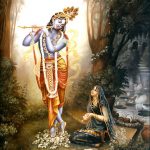What is True Religion According to Bhagavad Gita? – What is religion? Is it simply faith? To understand what is true religion, let us talk about what is religion. The English word religion conveys the idea of faith, and faith may change. One may have faith in a particular process, and he may change this faith and adopt another. In human society, for instance, religion generally invokes various conceptions such as Hindu, Muslim, Christian, etc, and thus, loosely corresponds to a particular faith; we see differences in the way people of various faiths lead their lives. Many times, these differences also lead to hatred and so forth. How can religion in its true sense lead to these unwanted and unpleasant effects?
What is True Religion According to Bhagavad Gita?
Published on: June 29, 2020
| Last Updated on: February 24, 2026




